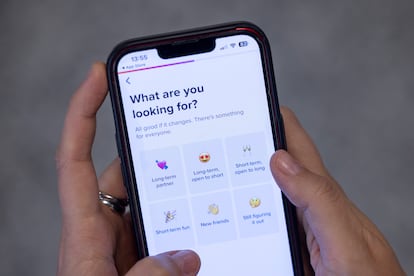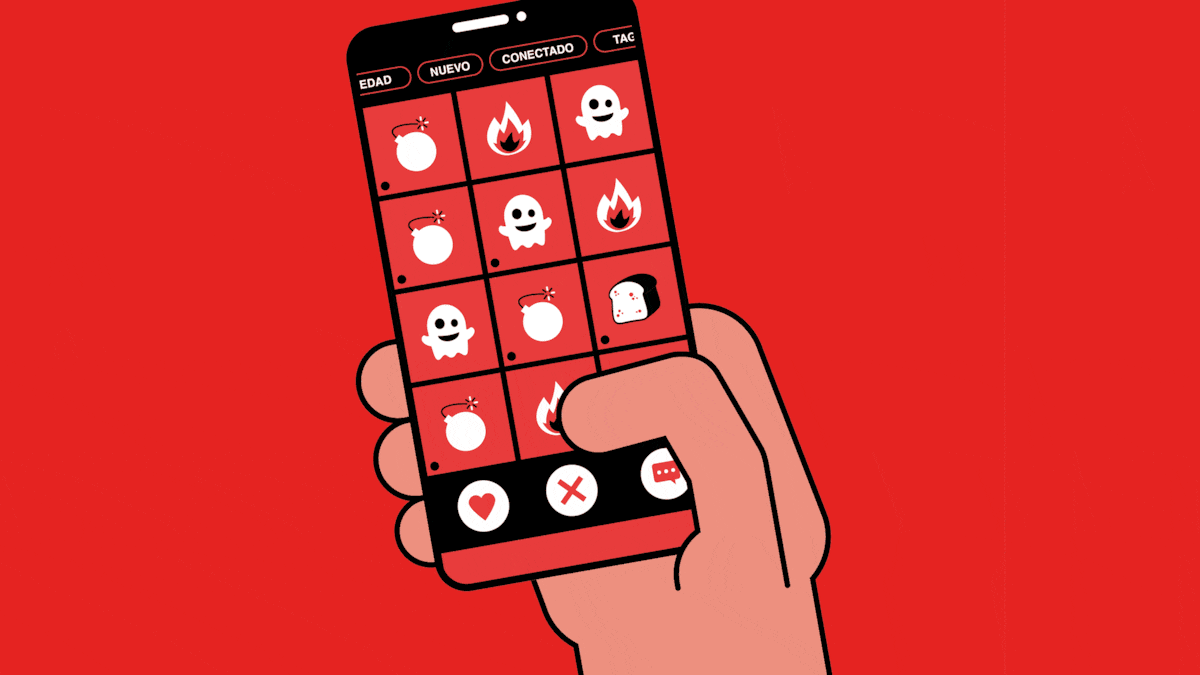Cupid is no longer called Cupid. Now it’s called Tinder, Bumble, Grindr, Badoo, Hinge… Dating apps have shaken up the way emotional and romantic connections are made around the world, as well as the dynamics that accompany these new ways of relating. Along with matches, blocks, sparks, and superlikes, new words are emerging that describe very specific behaviors: ghosting, when a flirt suddenly and forever disappears; breadcrumbing, when someone shows intermittent signs of interest but without commitment or emotional responsibility; or zombieing, when the ghost re-establishes contact as if nothing had happened. Although these are not phenomena exclusive to the virtual world, they do seem to occur there more frequently, according to the experts consulted.
All of these concepts reflect attitudes and behaviors that can impact mental and sexual health, both for the person who practices them and for the person who suffers from them. One study warns, for example, that breadcrumbing causes sufferers to experience greater life dissatisfaction and loneliness, and can jeopardize their future relationships. There is also research that points to the harmful effect of ghosting on self-esteem, and it has been reported that around 7% of the information shared on these platforms is false, primarily to make it more interesting. But these lies can erode trust and alter the way people relate to each other.
Scientific evidence about the bitter side of relationships on dating apps is still trickling in, but it has coincided with the emergence of certain signs of weariness among users of these platforms. After a decade of resounding success — one study estimates that 40% of Spaniards have used apps to meet other people — virtual cupids have lost thousands of paying users, and their parent companies have suffered stock market declines.
Francisca Molero, director of the Ibero-American Institute of Sexology and a clinical sexologist at the Clínica Máxima in Barcelona, also sees this in her practice. “There’s a growing sense of weariness. They don’t want to enter into that vortex of meeting people every week, having to have sex on the first date, and everyone else going for the same thing. People are getting tired,” she says.
Sexologist Ignasi Puig Rodas believes that the sense of speed, the ability to overcome the barriers of face-to-face dating, and the perception of abundance that characterize these apps — there are many profiles to choose from — are leading to “more superficial relationships and a certain cruelty” in dealing with people. “One of the complaints people have is that they want authenticity and only see superficial things,” explains this expert, who is a member of the Catalan Society of Sexology of the Academy of Medical Sciences of Catalonia.
These online romance businesses have been navigating a sea of ambivalence: on the one hand, they’ve facilitated sexual relationships, but they’ve also revealed behaviors and attitudes that can take their toll on health. The ease with which unrealistic self-narratives are constructed and the loss of spontaneity — especially with the arrival of chatbots that act as virtual love assistants and help curate the best responses for flirting — have further distorted the dynamics on these dating apps, and no one is sure now what’s true and what isn’t.
And with good reason: a Forbes survey found that one in five people lie about their age, 14% lie about their income or hobbies, and 13% lie about their job, their dating history, or their marital status. “There’s an idea that people always lie, and you already have a certain barrier, which makes it difficult to establish lasting relationships,” Molero says.
The emotional imprint of ghosting
Science and the public have also named and brought attention to other behavioral dynamics that, beyond lying, can distort relationships. Regarding ghosting, for example, Molero explains that “people take it badly” because they don’t understand what happened. “You even wonder what you did wrong. It’s terrifying not understanding what’s happening. It creates a feeling of chaos and uncertainty that can affect future relationships,” she emphasizes. Some people even have to go through a kind of grieving process, she explains.
These disappearances without a trace are relatively common. Research in the United States estimates that up to one in five respondents has experienced it, and between 10% and 30% have actually engaged in the behavior. The range is wide. In Spain, a survey of more than 600 people found that 20% had experienced or initiated ghosting; and around a third reported having experienced breadcrumbing or having practiced it in the past year. That study revealed that dating app use spurs both behaviors, and the researchers also found that they were more common among the LGBTQ+ community.
Regarding the motivations behind ghosting, Raúl Navarro, professor of social psychology at the University of Castilla-La Mancha and lead author of the research, asserts that there are gender differences. Women, for example, resort to this practice more often “when interactions take on more aggressive overtones or they see a risk of an unpleasant situation occurring,” he explains. But there are also those who make this decision unilaterally, perhaps as “a justification mechanism,” thinking that the other person won’t be happy with them and wanting to spare them what will happen next. “All of these are ways of avoiding direct confrontation,” Navarro points out.
Emotional manipulation strategies
The behavior of giving away crumbs of interest, with a like or a sporadic comment to keep someone’s attention, the expert says, has “shades of an emotional manipulation strategy,” the consequences of which are usually more serious. “It’s a strategy of: ‘I want you to pay attention to me, I want you to flatter me.’ It has also been seen to be related to narcissism,” explains Navarro. And he points out that it has also been linked to insecure attachment: “These are people who need to establish bonds and, sometimes, they want excessive attention, but then they don’t feel comfortable with that closeness and they distance themselves. In this case, it’s not with the intention of causing harm, and this avoidant attachment can work for the person who practices it because of their inability to establish healthy relationships.”

The worst part, of course, is for those who suffer from it: they may come to believe that the same thing could happen to them in future relationships. “And it’s also linked to emotional loneliness and the inability to establish strong social bonds,” the scientist adds. Along the same lines, Molero describes breadcrumbing as “the most toxic thing there is and the most addictive.” He explains: “It’s the ambivalence: giving you crumbs so you don’t lose interest, but that ends up creating a lot of uncertainty and anxiety. It’s very distressing.”
Battle for attention
Álex García Alamán, a member of the Clinical Psychology Section of the Official College of Psychology of Catalonia, agrees that the functioning of the app itself also plays a key role behind many of these dynamics. The expert, who wrote a doctoral thesis related to the creation of Tinder profiles, emphasizes that these apps, which are marketed as a quick way to flirt with an almost endless supply of profiles, “have become a kind of filtering process,” and people aren’t aware of how much time they’ll have to invest in each match. “Behind ghosting, one may believe they’re being mistreated and rejected, but what may be happening is that they’re not being paid attention to. Not because someone wants to mistreat them, but because they don’t want to invest time [in that person]. And it’s cheaper to say nothing.”
And the same thing happens with breadcrumbing, he points out: “What may be behind it is a person who hasn’t decided where they’re going to focus their attention.”
In any case, that “rain of micro-disappointments” that people suffer when they don’t find what they’re looking for ends up taking its toll on self-esteem, to the point of causing people to think poorly of themselves. It also magnifies feelings of loneliness and encourages depersonalization, leading to cynicism and the belief that everyone is lying, says García Alama: “And those are the three dimensions of burnout. If you don’t know someone or don’t treat it as a game, everyone ends up burned out in the long run.”
All in all, and despite their drawbacks or the weariness they’re causing among users, virtual cupids don’t seem as though they’re going to die anytime soon, the psychologist believes: “They’re the lesser of two evils. People would rather go out, pursue hobbies, and interact there, but they don’t have the time. Dating apps are a response to the lack of free time, and people will end up coming back because they have no other choice.” Even if they come back filled with apathy, cynicism, and hopelessness, he assumes: “It’ll be like going into a nightclub and finding 90% of the people in a bad mood.”
Sign up for our weekly newsletter to get more English-language news coverage from EL PAÍS USA Edition


